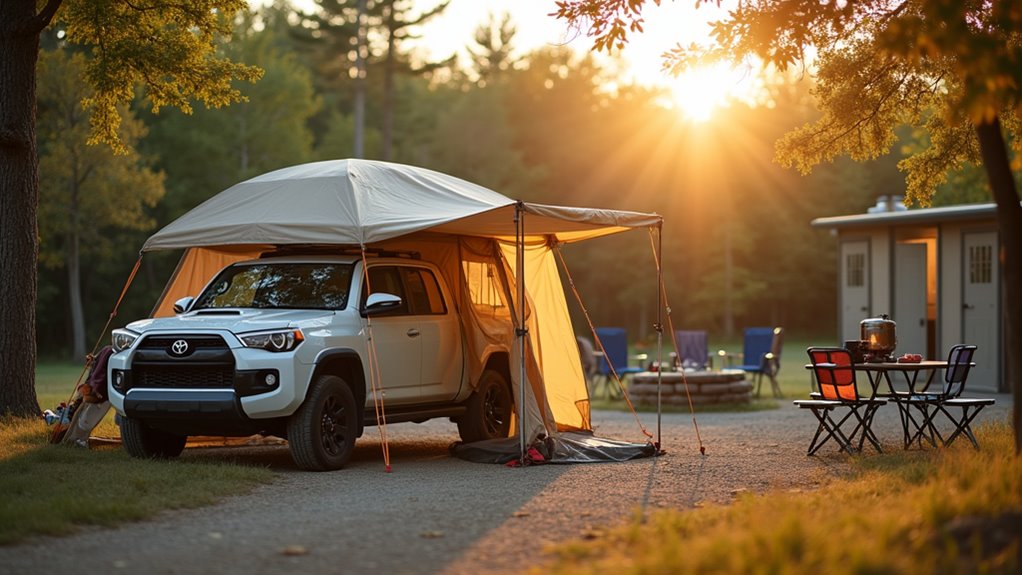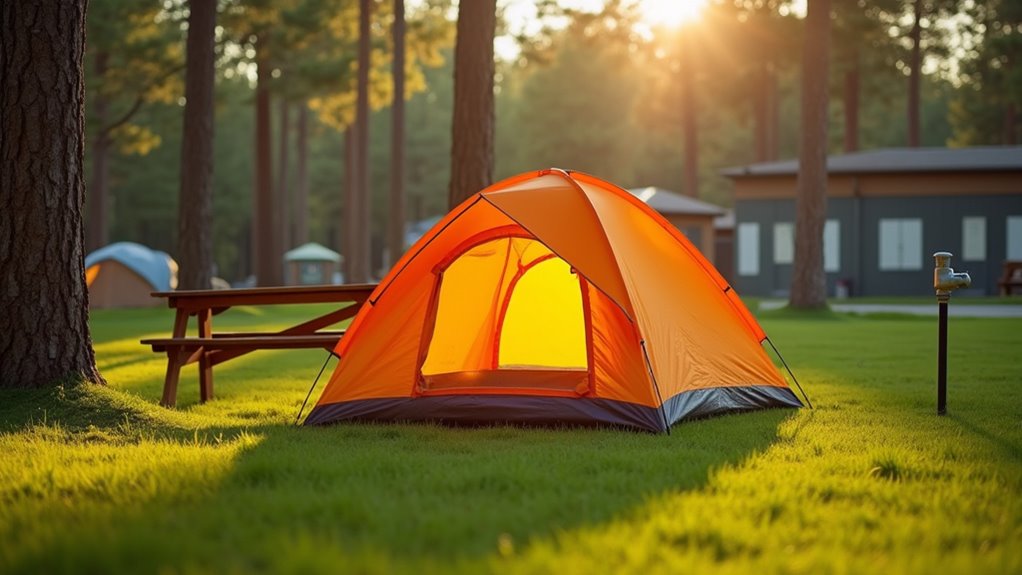Physical Address
304 North Cardinal St.
Dorchester Center, MA 02124
Physical Address
304 North Cardinal St.
Dorchester Center, MA 02124

Tired of complex camping advice that overwhelms beginners? These simple strategies make your first outdoor adventures stress-free and enjoyable.
You don’t need to become a wilderness expert overnight or invest in every piece of camping gear on the market. Starting with car camping at established campgrounds lets you test the waters without venturing too far from civilization. Simple meals, basic equipment, and favorable weather conditions will help you build confidence while discovering what you actually enjoy about outdoor adventures. The key is understanding which shortcuts and strategies can make your first few experiences both manageable and memorable.

When you’re new to camping, car camping offers the perfect stepping stone between indoor comfort and true wilderness adventures. You’ll have your vehicle nearby as a safety net, along with easy access to gear and supplies.
This proximity means you can pack more comfortably without worrying about weight restrictions that come with backpacking.
Car camping lets you test your equipment close to civilization. You’ll discover what works and what doesn’t before heading into remote areas.
If you forget something essential or encounter bad weather, you can simply drive home or to the nearest store.
Choose established campgrounds with amenities like restrooms and potable water. These sites offer security and convenience while you’re learning basic camping skills like setting up your tent and managing your gear efficiently.
Car camping also provides an ideal opportunity to practice camping with dogs in a controlled environment where you can easily address any challenges that arise.
While it’s tempting to buy every camping gadget you see, you’ll have a better experience by focusing on the fundamentals first. Start with the basics: a reliable tent, sleeping bag, sleeping pad, and camp stove. These four items will handle your core needs for shelter, warmth, comfort, and cooking.
Don’t worry about fancy camp chairs, portable showers, or solar-powered lanterns just yet. You can always add these later once you’ve figured out your camping style.
A simple headlamp, basic cookware, and a cooler will round out your essential kit. For staying clean on your first few trips, simple wet wipes or a basic washcloth will work fine before investing in camping showers.

Just as you prioritized essential gear over fancy extras, you should pick campgrounds that offer basic amenities rather than remote wilderness sites for your first few trips. Look for established campgrounds with restrooms, potable water, and designated fire rings. These features eliminate common beginner headaches and let you focus on enjoying the experience.
State parks and KOA campgrounds are excellent starting points. They typically provide clean facilities, clearly marked sites, and helpful staff who can answer questions. Many offer electrical hookups if you’re using an RV or want to charge devices.
Don’t worry about finding the most pristine wilderness location yet. You’ll build confidence and skills at beginner-friendly spots, making future adventures to remote areas much more enjoyable and successful. Consider purchasing travel insurance to protect your camping investment, especially for longer trips or when traveling far from home.
Another area where simplicity pays off is meal planning. You don’t need gourmet camping cuisine on your first trip. Instead, focus on easy meals that won’t stress you out or require advanced cooking techniques.
Start with foods you’re already comfortable preparing at home, then adapt them for outdoor cooking. Pre-cooked items and one-pot meals work exceptionally well for beginners.
Begin with familiar recipes from your kitchen and simplify them for campfire cooking using pre-made ingredients and single-pot methods.
Here are four simple meal ideas to get you started:
Once you’ve mastered basic camping meals, consider planning family adventures that combine outdoor activities with your newfound camping confidence.

Timing your first camping adventures around favorable weather conditions can make the difference between a memorable experience and a miserable one. You’ll want to avoid extreme temperatures, heavy rain seasons, and unpredictable weather patterns that can turn your trip into a survival challenge.
Spring and fall typically offer the best conditions for beginners. You’ll enjoy moderate temperatures that won’t leave you sweltering in your tent or shivering through the night. These seasons also bring fewer bugs and lighter crowds at popular campgrounds.
Check local weather patterns before booking your trip. Research the area’s typical conditions during your planned dates, and always have a backup indoor accommodation nearby for your first few outings. This safety net removes pressure and lets you focus on enjoying the experience.
If you’re planning to bring your four-legged companion along, fall camping offers particularly enjoyable conditions for dogs who can better handle the cooler temperatures and increased outdoor activity.
Rather than jumping into complex wilderness adventures, you’ll want to master basic outdoor skills in your backyard or local parks first. Think of this as building your camping foundation – each skill you develop makes future trips more enjoyable and safer.
Start with these fundamental skills:
You don’t need to become an expert overnight. Each camping trip offers opportunities to refine these skills naturally while you’re actually having fun outdoors. Following proven tent camping tips will help accelerate your learning process and build confidence for more adventurous outings.
You don’t need to conquer Mount Everest on your first weekend adventure! Start with car camping, pack only what you’ll actually use, and choose campgrounds that won’t leave you stranded in the Stone Age. Cook meals that won’t require a culinary degree, pick weather that won’t test your survival instincts, and build skills gradually. Before you know it, you’ll transform from camping rookie to outdoor enthusiast without the overwhelming gear avalanche that defeats so many beginners.